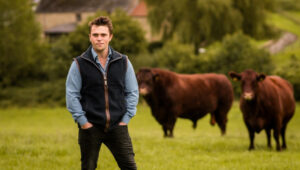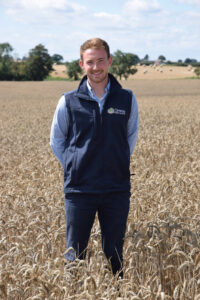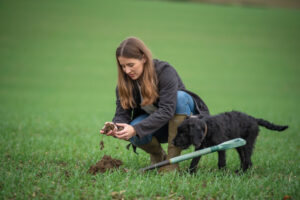This award is for a young agronomist, aged 30 or under. The recipient will be able to showcase how their expertise and guidance have resulted in measurable enhancements in the performance of the farms they serve. They will be recognised as a passionate and knowledgeable professional with a proven ability to effectively address challenges.
Ben Allard – Pearce Seeds
It was working with the family farm agronomist that ignited Ben’s interest in agronomy. A passion for crop production led to an agronomist and rural consultancy role with Pearce Seeds.
Ben is committed to regenerative farming methods, ensuring that his clients grow and raise their crops sustainably, but also recognises that no farm is alike and there has to be a sense of realism to what can be achieved.
He advises on environmental schemes, capital grants and Sustainable Farming Incentive, guiding clients towards building more sustainable businesses by integrating cropping and environmental strategies.
He is proud of his drive to agronomic strategies that cut carbon footprints while enhancing biodiversity. Indeed, this is to be the subject of a documentary featuring him and one of his clients, plus others who share the same aims.
 In 2020, he was awarded funding and a scholarship for his work with near-infrared spectroscopy sensors, exploring their potential to detect plant diseases in the early latent stages, well before visible symptoms appear.
In 2020, he was awarded funding and a scholarship for his work with near-infrared spectroscopy sensors, exploring their potential to detect plant diseases in the early latent stages, well before visible symptoms appear.
At just 26, it is some record and it is no surprise that he has been quick to see the opportunities presented by the latest technological advancements to enhance his role as an agronomist.
He is also prepared to explore new ideas, such as silicone as a deterrent against cabbage stem flea beetle in oilseed rape.
Josh Greasley – HL Hutchinson
An advantage of having someone from the outside looking in is that they often have a different perspective. That is very much the case with Josh. Despite being a recent arrival to the Hutchinsons team, he has questioned growers on where their focus should be. He admits yield is important, but says it’s not the “be-all and end-all”.
 The same attitude has been applied to more tactical decisions such as weed control. Burgeoning blackgrass and ryegrass pressures for some growers persuaded Josh to call for a rethink. A host of cultural measures, including a training course on machinery cleaning, has cut weed burdens and lowered weed control costs.
The same attitude has been applied to more tactical decisions such as weed control. Burgeoning blackgrass and ryegrass pressures for some growers persuaded Josh to call for a rethink. A host of cultural measures, including a training course on machinery cleaning, has cut weed burdens and lowered weed control costs.
Josh is also making the most of the tools around him to take growers down the journey of a more prescriptive approach. Products like Omnia and TerraMap are allowing him to target inputs precisely to even out fields and cut costs. One variable-rate trial Josh instigated revealed £66/ha in liming costs in one pasture field.
His view is that businesses need to be flexible to deal with the ever-changing political aspects of agriculture and more extreme weather conditions. With margins being tighter, he has highlighted how savings can be made through precision agriculture.
He has also focused on what else can be done to improve farm performance and sustainability. He has been proactive in identifying underperforming field areas where Sustainable Farming Incentive options can offset potential losses without making short-term decisions or taking land out of production.
Louise Penn – Ceres Rural
If there was an agronomist form guide for Louise it would read “one to follow”. Indeed, many already are, her Instagram account has close to 10,000 followers. She uses the platform to educate farmers, landowners and the public.
 Bringing a wealth of arable and livestock farming knowledge, the latter useful for regeneratively minded clients, Louise recently added viticulture to her skill set after completing a course on vine growing at Plumpton College. This rapidly growing sector is something she is helping Ceres Rural to develop and some of her arable clients have already stepped into this potentially lucrative area.
Bringing a wealth of arable and livestock farming knowledge, the latter useful for regeneratively minded clients, Louise recently added viticulture to her skill set after completing a course on vine growing at Plumpton College. This rapidly growing sector is something she is helping Ceres Rural to develop and some of her arable clients have already stepped into this potentially lucrative area.
Looking to the future, Louise intends to obtain the CAAV qualification. With margins tightening, she recognises that a better understanding of the whole farming business is more important than ever. She also intends to complete a Nuffield scholarship – looking at the links between regenerative farming practices and the nutrient density of food.
Her core interest is in regen farming, and she has spent the past three years developing her knowledge in this area. In her view, a good way to learn is to get out on farm and she has joined several organisations such as BASE UK, WildFarmed, Regenerative Viticulture Foundation and Emergent Generation.
She recognises that every farm is unique and requires tailored solutions to optimise field and farm performance. This is achieved by making use of all that is available, whether it be a raft of technologies to refine crop management practices, integrated pest management, grants and/or environmental schemes.



